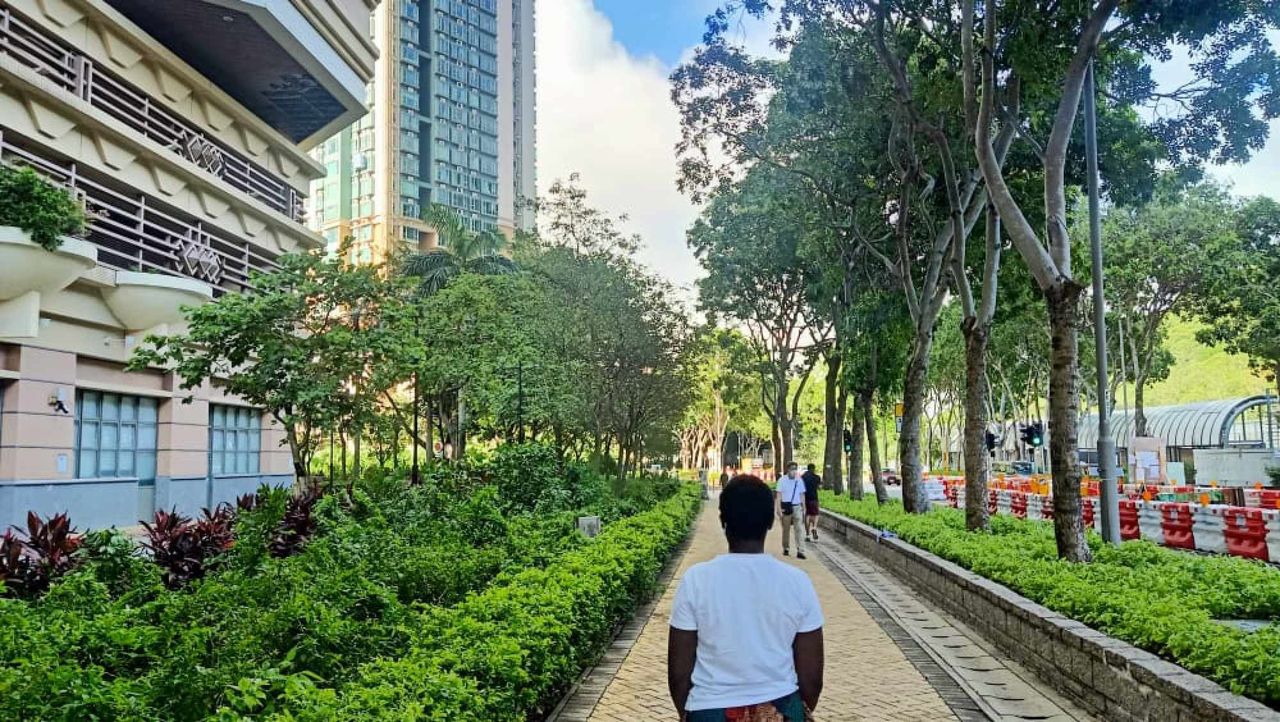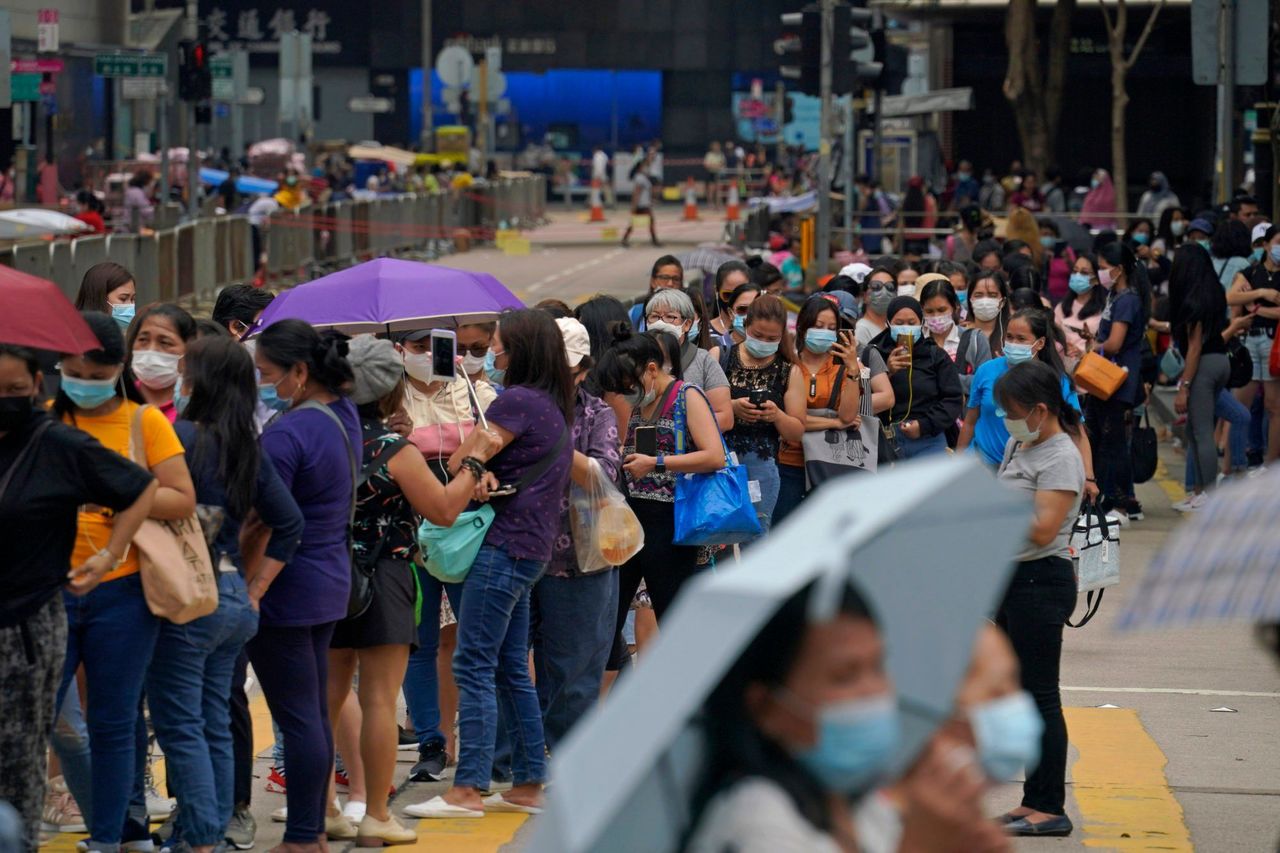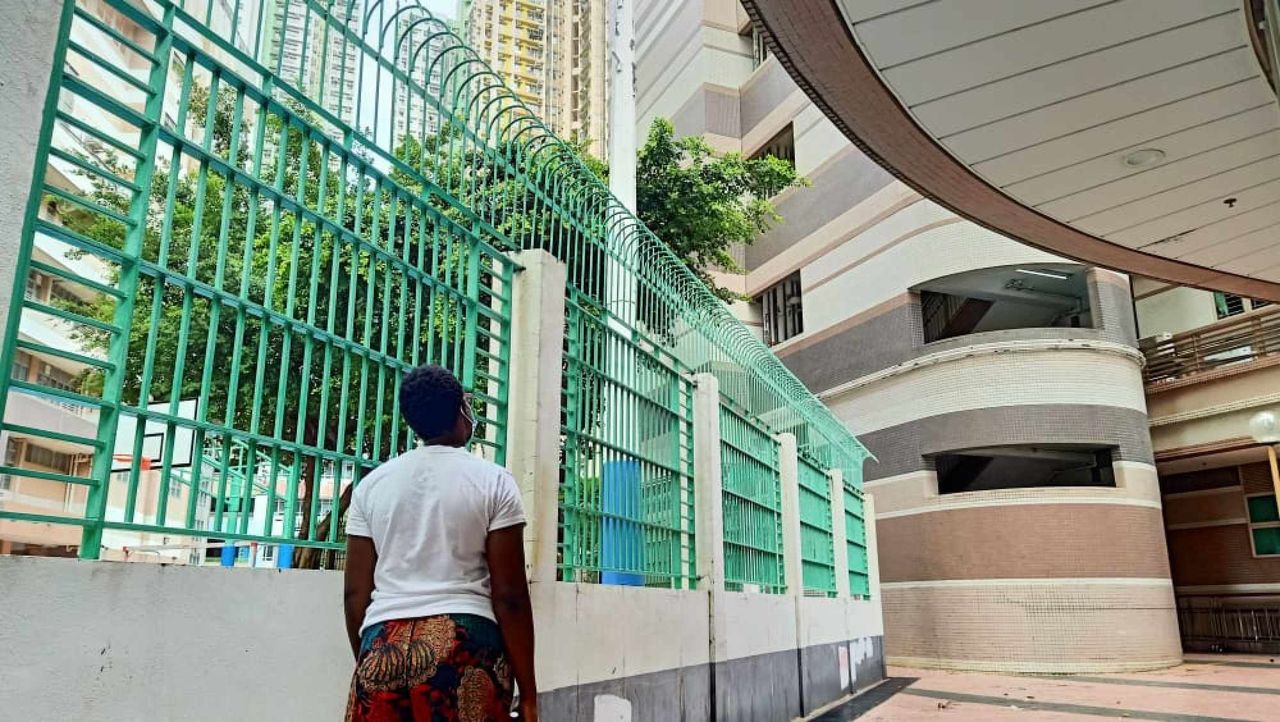An advocate says Kenyan workers in Hong Kong are working ‘like slaves’, with some reporting verbal abuse, lack of food and limited freedom of movement.
Meryl*, a Kenyan domestic worker in her late 20s, came to Hong Kong with high hopes.
“I needed to sacrifice for my family so they could have a better life,” she said, referring to her three children aged between two and six. “I believed this job was going to pay well and that I would have a good employer.”
She decided to seize the opportunity after a friend told her about an employment agency in the city. Little did she know what was to come.
Soon, Meryl was told she would have to go through a “mandatory probation” of three months without any rest. Instead of time off, she would receive HK$150 (US$19) per day.
But the worst thing, Meryl said, was being shouted at by her employer and being unable to speak to her family or leave the house by herself. “The only time I was allowed to go out was to pick up the newspaper and drop off the garbage,” she said.
This Week in Asia spoke to five Kenyan domestic workers and saw written statements of three other workers who claimed they had paid excessive fees, worked long hours, faced intimidation and verbal abuse, were given insufficient food, and had limited freedom of movement and communication while in Hong Kong.
Most blamed the employers they worked for and the agency that brought them to the city. The agent has denied all the allegations.
While the Hong Kong government recognised one Kenyan domestic worker as a human trafficking victim, experts say many others have fallen through the cracks. They urged authorities to improve the screening mechanism, introduce new laws, and further support victims.
For several days after arriving in the city, Meryl was unable to speak to her family and, even after being given her employer’s Wi-fi password, it was difficult to call her children.
“I was told that I could only use it between 6pm and 9pm, but I was working then, and when I went to bed the Wi-fi was off,” she said.
On Sundays, instead of resting, Meryl was taken to clean the house of her employer’s relatives. Working in a place other than the address specified in the employment contract is illegal, but Meryl said she had no choice.
As the verbal abuse continued, she decided to quit after receiving her first salary. “Honestly, I was so afraid of [my employer]. Everything I was doing was not good, she was never happy.”
 It is illegal to work in a place other than the address in the employment contract, but Meryl said she had no choice.
It is illegal to work in a place other than the address in the employment contract, but Meryl said she had no choice.
No privacy
Deborah*, in her 20s, finished her first work day in Hong Kong at 1am.
Although her contract said she would share a bedroom with a child, Deborah had to sleep in a small bed under a cupboard in the living room. It was near the front door, with security cameras pointing at that area – making her feel constantly monitored.
“I could not rest and had no privacy,” she said, noting she would often be woken up by the noise of people coming in and out of their bedrooms. “It was really uncomfortable.”
Deborah said she had to work about 17 hours per day, while being given little food.
But things got even worse when she contracted Covid-19 after members of the family fell sick – at that point, she feared for her life.
“I felt very unsafe. It was crazy, people kept coming in and out of the house. That environment was not conducive for me to continue working there, as much as I loved the kids,” she said, referring to two children she looked after.
Deborah eventually quit about four months into her job, claiming that during that time, she didn’t have days off and was not allowed to leave the house by herself.
As of the end of July, there were 29 Kenyan domestic workers in Hong Kong, according to the Immigration Department.
A spokesman told This Week in Asia that 74 Kenyan domestic workers’ applications were approved for entry to Hong Kong from 2018 to July this year – 26 of those were processed between last year and the end of July.
In total, there are about 330,000 foreign domestic workers currently in the city, mostly from the Philippines and Indonesia.
According to advocates, Kenyan domestic workers are more vulnerable than other groups due to greater isolation and less knowledge about their rights in the city.
‘Working like slaves’
Jayne, an independent advocate who requested to only use her given name due to safety reasons, has supported dozens of Kenyan women.
“Many girls are too afraid … I am speaking to about 10 at the moment. If they could, they would leave their jobs,” she said.
Jayne is frustrated at repeatedly seeing similar cases allegedly involving excessive fees and abusive employers who expect helpers “to work around the clock like slaves”.
Kenyan domestic workers, she said, “should be entitled to the same protections under the Hong Kong laws [as other migrant workers], but that’s not happening”.
Jayne said the pace at which authorities handled cases was too slow, adding she had noticed “racial bias” in some instances.
“I wished authorities would speak to all the girls [the agency] brought in. Many of these things can be fixed,” said Jayne, arguing that victims should not be penalised and sent home.
Hong Kong’s employment agency sector has long been plagued by claims of illegal practices, including charging excessive fees, which has led to thousands of workers falling into debt traps.
Agencies can only legally take 10 per cent of the worker’s first month’s salary, corresponding to about HK$463 (US$59) based on the minimum wage.
“When I first contacted [the agent in Hong Kong], she sent me a text message with … how much we needed to pay for air tickets, visa, contract, identity card, and so on,” Meryl said, adding that she also had to cover her medical check-up and Covid-19 test.
Both Meryl and Deborah said that, before coming to the city, they were asked to pay 173,000 Kenyan shillings (US$1,430) in two instalments, which they believed went to a lawyer and an agent via intermediaries.
Some women said they had to use their savings, take loans, or borrow money from friends and relatives in their home country, where the current minimum wage is 13,500 Kenyan shillings (US$112) per month.
Instead of making advance payments, former domestic workers also claimed in written statements to the authorities they had agreed with the agent to have a deduction of HK$4,000 to their salaries over six months.
 Migrant workers line up at a Covid-19 testing centre in Hong Kong. There are 330,000 foreign domestic workers in the city.
Migrant workers line up at a Covid-19 testing centre in Hong Kong. There are 330,000 foreign domestic workers in the city.
A spokeswoman for the Labour Department revealed that from 2017 to the end of July, it received 16 complaints from domestic workers against the Talent (Kenya) Company Limited – which describes itself as the only local employment agency bringing Kenyan domestic workers to Hong Kong – and/or an associate of the agency. The claims were focused on “suspected offences of overcharging of commission or non-compliance with the Code of Practice for Employment Agencies”.
She said authorities had investigated cases and conducted “surprise inspections to examine [the agency’s] documents”.
Two cases were prosecuted – with “evidence substantiating that the [agency] staff had overcharged the commission of HK$4,779.49 and HK$11,580.61 from two foreign domestic workers”, the spokeswoman said.
While the agent was acquitted in one case, she was convicted on May 31 last year of overcharging a domestic worker and was sentenced to a fine of HK$8,000, in addition to being ordered to refund the excessive placement fee.
But the agent has appealed and a judgment on that appeal has yet to be handed down.
If the appeal is dismissed, the spokeswoman said the agency’s licence would be revoked.
The remaining cases, she added, were under investigation or could not be prosecuted “due to reasons, such as refusal of the complainants to act as the prosecution witness or no evidence found to substantiate an offence”.
Ivy Lau, assistant consultant with Talent (Kenya) Company Limited, rejected the accusations.
“After those girls understand the job nature and law [of] Hong Kong, they need to sign the contract and documents in front of a lawyer. This is a normal process in Kenya if they want a job in Hong Kong. So how can I overcharge them, deduct their salaries, forge their signatures? All of those complaints are fake complaints about us,” Lau said.
She claimed that she never told helpers to work 90 days without days off – but workers shared screenshots of conversations that suggest otherwise.
“After they arrive in Hong Kong and work in the employer’s house, my job is finished … Even [if] she wants to leave her job, this is her right,” she said.
Lau alleged that non-profit advocates have misled some “naive” domestic workers.
“They don’t need complaints, accusations against employers or agents. They just need a job to support their family” and time to adapt to the local culture, Lau said, claiming that she had “worked very hard to protect them”.
She said it was a “big lie” that Kenyan domestic workers had been formally identified as trafficking victims in Hong Kong.
A spokesman for the Security Bureau said over the past five years, authorities had identified 34 victims of human trafficking – three of them were Kenyans, including one who came to Hong Kong as a foreign domestic worker.
In August, the city’s High Court heard a judicial review on a case of two Kenyan domestic workers challenging how they were screened as potential human trafficking and forced labour victims. The pair argue that both the fundamental definitions and the assessment method were inadequate in addressing forced labour and slavery issues.
David Bishop, co-founder of Migrasia – a social enterprise focused on migration issues – said authorities had failed to identify many victims.
He said the Kenyan domestic worker who was recognised as a victim of human trafficking “came with the same agency under almost exactly the same circumstances as the other domestic workers, so why were they also not identified?”.
The agency’s licence, in his opinion, should be immediately rescinded.
“It is irresponsible to allow a convicted [agency] to maintain its licence during the time of appeal, because from the burden of proof standpoint they have been proven guilty in a court of law … It has only led to more mistreatment,” Bishop claimed, noting the agency could reapply for a licence if they won on appeal.
The law professor said Kenyan domestic workers had been failed by multiple government agencies.
“There has been just an overall lack of willpower to ensure they have been taken care of,” Bishop said. “When you consider these are some of the most vulnerable people in our society, it doesn’t reflect well on Hong Kong, its government, and its people. We can definitely do better.”
 Meryl is pinning her hopes on the processing of a new work visa, which would allow her to work for another employer.
Meryl is pinning her hopes on the processing of a new work visa, which would allow her to work for another employer.
Both Deborah and Meryl, who filed claims against their employers and agent, settled their cases out of court.
Meryl received about HK$9,000 as compensation from her employer and gave a witness statement to the authorities for an ongoing investigation into the agent’s practices.
She is currently pinning her hopes on the processing of a new work visa, which would allow her to work for another employer she found by herself in the city. But she has been waiting for months, forcing her to rely on charities and kind individuals to get by.
“We come here with the intention of working. I cannot say all employers are bad, not all Chinese are bad,” Meryl said. “All we want is to be treated like human beings, regardless of being black.”















